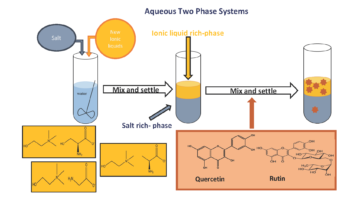
Elena Gómez Costas, Associate Laboratory LSRE-LCM | November 21, 2019 – 17h00 | FEUP Sala B020
Flavonoids are components present on fruits and vegetables, which have several pharmacological properties, including anti-tumor, antioxidant, anti-inflammatory, among others. The extraction and separation of flavonoids from natural products is, therefore, important to their future applications.
The conventional processes used in the extraction of flavonoids include techniques as solid-liquid, liquid-liquid or supercritical fluid extraction, the main process to obtain flavonoids for biotechnological applications is hydroalcoholic extraction, using different solvents such as methanol or ethanol, being the yield and purity low, and the consumption of solvents excessive, causing high production costs. In the mid-1950s, Albertsoon proposed the use of Aqueous Two-Phase Systems (ATPS) as an alternative to traditional liquid-liquid equilibria (LLE) extraction. ATPS is a separation technique with very low environmental impact due to the high content of water, recognized as biocompatible media for biologically active substances. Conventional ATPS consist of mixtures of water plus one polymer and one salt or water and two different polymers. In 2003, Rogers reported a pioneering work about the formation of ATPS by the addition of K3PO4 salts to aqueous solutions of butylmethylimidazolium chloride ionic liquid (IL). Nevertheless, the use of ILs as alternative phasecomponents in ATPS has been studied, most of the ILs used are derived from imidazolium and pyridinium cations with halides as anions. However, these ILs are toxic and poorly biodegradable. In recent years choline amino acids ionic liquids (CAAILs) showed an excellent biodegradability and low toxicity, and amino acids are adequate candidates as anions and provide a suitable separation media for biomolecules.
Consequently, ATPS based on IL have been significantly explored for the extraction of amino acids and proteins. In view of the above-mentioned, in this work, it presents the study of the partitioning of different flavonoids in new choline amino acids ionic liquids based ATPS as separation technique, since it is recognized as a high efficient method for the separation and purification of biomolecules.
Elena Gómez Costas obtained her Ph.D. Thesis at the University of Vigo, in 2008, obtaining the Thesis
Extraordinary Prize. After the PhD, she was selected by FCT for a post-doctoral grant at University of Porto, under the supervision of Professor M. Eugénia Macedo (LSRE-LCM) from January 2009 to October 2010. After this, and thanks to an Ángeles Alvariño Program (Xunta de Galicia), she continued her research career at the University of Vigo in the separation of mixtures with ILs. From June 2016 to May 2019, she was a post-doctoral researcher at LSRE-LCM under project AIProcMat@N2020 on the field of partitioning of biomolecules using aqueous two-phase systems with ILs. From June 2019 she has an Assistant Research position of the FCT Stimulus of Scientific Employment Individual Support for developing a project on extraction of vitamins and antioxidants towards health improvement.
[Host: Eugénia Macedo]
Image credits: Elena Gómez Costas
